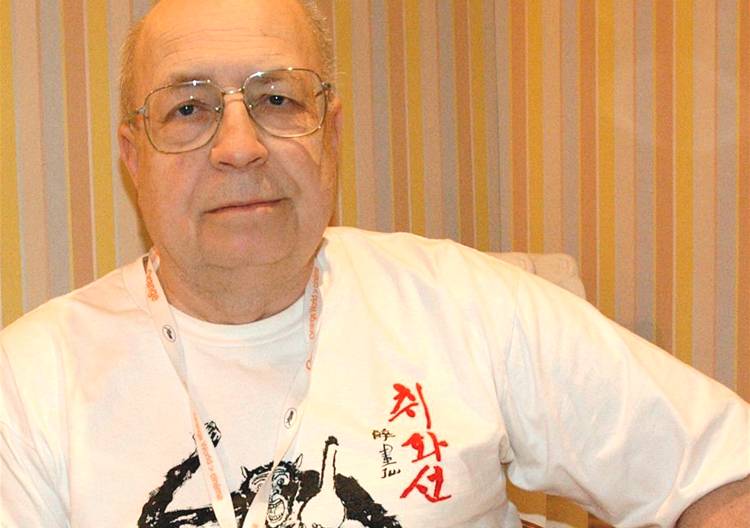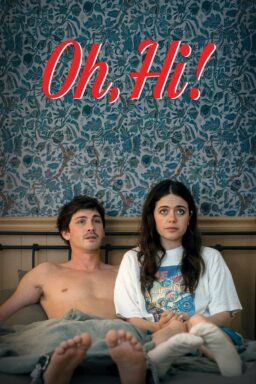Pierre Rissient passed away on May 6th, 2018 at the age of 81. We send our condolences to his friends and family and reprint this article by Roger in his memory.
TORONTO, Ont.-Attached to this article should be a photograph. Study it carefully. The next time you are at the Cannes, Toronto, Telluride, Pusan, Berlin, Venice or Sundance film festivals, you will see this man. His name is Pierre Rissient. You may also see him in Paris, Los Angeles, Hong Kong, Shanghai, and in the weather reports.
It is probable that Pierre, a Frenchman, knows more directors, actors, distributors, exhibitors and critics than any other single person in the film industry. I call him Pierre because I have known him for 30 years, and in recent years he has given me my daily instructions every morning in the breakfast room of the Hotel Splendid at Cannes. Pierre issues a lot of instructions.
But who is he, and what does he do? These are the questions that Todd McCarthy, chief film critic for Variety, sets out to answer in his new documentary, “Man of Cinema: Pierre Rissient.” As far as I am concerned, it could also be called “Pierre Rissient: International Man of Mystery.”
These are things we know. Pierre programmed the screenings of American crime movies in Paris that essentially created film noir. Popularized his favorite American directors in Paris, essentially preparing for ground for the auteur theory to be invented. At the birth of the New Wave, Pierre was assistant director for Claude Chabrol, and on Godard’s “Breathless” (1960). Partnered with future director Bertrand Tavernier as “the two best movie publicists in Paris.” Resurrected critical respect for Otto Preminger, Joseph Losey, Anthony Mann, Samuel Fuller. Carried a drunken John Ford around Paris for a week. Created the worldwide popularity of King Hu (“A Touch of Zen”) and other martial arts directors. Directed two films of his own, not widely seen.
Went to China and brought back the films of Chen Kaige and Zhang Yimou. Introduced the Filipino director Lino Brocka to the world. Single-handedly masterminded Clint Eastwood’s embrace by Europe, which in turn elevated his American status. Discovered Australia’s Jane Campion, booked her three short subjects at Cannes, and then was responsible for her “The Piano” playing at Cannes, which led to the Palme d’Or and three Academy Awards. As the most trusted advisor to Cannes boss Gilles Jacob, led the festival’s embrace of Asian cinema. Is the only person in the world who can walk into any screening at Cannes at will, including the evening black tie events, to which he wears a T-shirt or safari shirt. Just had his own theater, The Pierre, named after him at Telluride.
And I grow breathless. All of these accomplishments and many, many more are covered in McCarthy’s doc, which will be fascinating for anyone who has ever met Pierre (millions, I suppose) but not so much for others, unless you want to see a man obsessed with his lifelong passion for the cinema. (Also a passion for girlfriends, usually young and Asian, which the doc does not neglect to mention.) Pierre lives and breathes the movies, and more than anyone else has influenced the success of the good (key word) films we notice and the directors we admire. You don’t believe me, see this documentary and take notes.
Pierre’s role in many situations is to “defend,” by which he means “support,” the films and directors he approves. Telluride once printed a t-shirt quoting him: “It is not enough to like a film. One must like it for the right reasons.” Michel Ciment, the famous French film critic, remembers in the film that when Rissient and Tavernier were promoting films as publicists, they used a screening room with a long, narrow corridor, so that it was impossible to leave without passing both of them. They wanted to be sure you liked the film, and for the right reasons, and if you did not, they would tell you why you were wrong. Uniquely among publicists, they would only handle films which they loved-for the right reasons, of course.
One night at Cannes, Pierre used a motorboat to take seven American film critics out to Francis Ford Coppola’s yacht, floating in the bay in anticipation of the world premiere of “Apocalypse Now.” It was on this evening that Coppola made his infamous remark that he didn’t know if the ending worked, by which he meant dropping the credits on the road-show version, and the world thought he meant the whole Marlon Brando sequence.
Nevertheless, “Apocalypse Now” won the Palm d’Or, although for the only time in history there was a tie for the top award, with Volker Schlondorff’s “The Tin Drum.” How did Pierre let that happen? The following December, I was in Los Angeles when the telephone rang in my hotel room (Pierre can find anybody at any time).
“What are you doing in L.A.?” I asked him.
“Handling the Oscar campaign for ‘The Tin Drum’,” he said.












